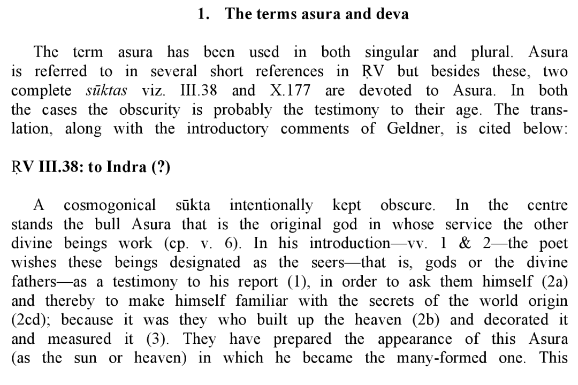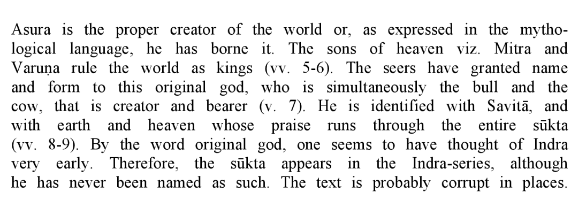In a Rig Veda, the word asura can be found over 100 times, in which most of the times it conveys positive sense while disparaging reference occurs only a very few.
It is generally associated with different Vedic gods:
with Agni RV 2.1.6, RV 3.3.4;
त्वमग्ने रुद्रो असुरो महो दिवस्त्वं शर्धो मारुतं पृक्ष ईशिषे ।
त्वं वातैररुणैर्यासि शंगयस्त्वं पूषा विधतः पासि नु त्मना ॥६॥
पिता यज्ञानामसुरो विपश्चितां विमानमग्निर्वयुनं च वाघताम् । आ विवेश
रोदसी भूरिवर्पसा पुरुप्रियो भन्दते धामभिः कविः ॥४॥
with Indra RV 1.54.3, 1.174.1;
अर्चा दिवे बृहते शूष्यं वचः स्वक्षत्रं यस्य धृषतो धृषन्मनः ।
बृहच्छ्रवा असुरो बर्हणा कृतः पुरो हरिभ्यां वृषभो रथो हि षः ॥३॥
त्वं राजेन्द्र ये च देवा रक्षा नॄन्पाह्यसुर त्वमस्मान् ।
त्वं सत्पतिर्मघवा नस्तरुत्रस्त्वं सत्यो वसवानः सहोदाः ॥१॥
with Varuṇa RV 1.24.14, 1.151.4;
अव ते हेळो वरुण नमोभिरव यज्ञेभिरीमहे हविर्भिः ।
क्षयन्नस्मभ्यमसुर प्रचेता राजन्नेनांसि शिश्रथः कृतानि ॥१४॥
प्र सा क्षितिरसुर या महि प्रिय ऋतावानावृतमा घोषथो बृहत् ।
युवं दिवो बृहतो दक्षमाभुवं गां न धुर्युप युञ्जाथे अपः ॥४॥
with Savitṛ RV 1.35.7, RV 1.35.10;
वि सुपर्णो अन्तरिक्षाण्यख्यद्गभीरवेपा असुरः सुनीथः ।
क्वेदानीं सूर्यः कश्चिकेत कतमां द्यां रश्मिरस्या ततान ॥७॥
हिरण्यहस्तो असुरः सुनीथः सुमृळीकः स्ववाँ यात्वर्वाङ् ।
अपसेधन्रक्षसो यातुधानानस्थाद्देवः प्रतिदोषं गृणानः ॥१०॥
with Soma RV 9.74.7, RV 9.99.1;
श्वेतं रूपं कृणुते यत्सिषासति सोमो मीढ्वाँ असुरो वेद भूमनः ।
धिया शमी सचते सेमभि प्रवद्दिवस्कवन्धमव दर्षदुद्रिणम् ॥७॥
आ हर्यताय धृष्णवे धनुस्तन्वन्ति पौंस्यम् ।
शुक्रां वयन्त्यसुराय निर्णिजं विपामग्रे महीयुवः ॥१॥
with Pūsan RV 5.51.11;
स्वस्ति नो मिमीतामश्विना भगः स्वस्ति देव्यदितिरनर्वणः ।
स्वस्ति पूषा असुरो दधातु नः स्वस्ति द्यावापृथिवी सुचेतुना ॥११॥
with Dyaus RV 1.122.1, RV 5.83.6
प्र वः पान्तं रघुमन्यवोऽन्धो यज्ञं रुद्राय मीळ्हुषे भरध्वम् ।
दिवो अस्तोष्यसुरस्य वीरैरिषुध्येव मरुतो रोदस्योः ॥१॥
दिवो नो वृष्टिं मरुतो ररीध्वं प्र पिन्वत वृष्णो अश्वस्य धाराः ।
अर्वाङेतेन स्तनयित्नुनेह्यपो निषिञ्चन्नसुरः पिता नः ॥६॥
et cetera.
In all these cases the word asura means valor, might, vigour. In some instances, the word asura is used as an epithet for the supreme God. For example, Agni and Varuṇa were called asura and called son of asura.
See RV 3.29.11 for Agni
तनूनपादुच्यते गर्भ आसुरो नराशंसो भवति यद्विजायते ।
मातरिश्वा यदमिमीत मातरि वातस्य सर्गो अभवत्सरीमणि ॥११॥
and RV 5.85.5 Varuṇa
इमामू ष्वासुरस्य श्रुतस्य महीं मायां वरुणस्य प्र वोचम् ।
मानेनेव तस्थिवाँ अन्तरिक्षे वि यो ममे पृथिवीं सूर्येण ॥५॥
Mitra and Varuṇa cause rain from heaven by using the power of asura (RV 5.63.3)
सम्राजा उग्रा वृषभा दिवस्पती पृथिव्या मित्रावरुणा विचर्षणी ।
चित्रेभिरभ्रैरुप तिष्ठथो रवं द्यां वर्षयथो असुरस्य मायया ॥३॥
and maintain law and order using the power of asura (RV 5.63.7).
धर्मणा मित्रावरुणा विपश्चिता व्रता रक्षेथे असुरस्य मायया ।
ऋतेन विश्वं भुवनं वि राजथः सूर्यमा धत्थो दिवि चित्र्यं रथम् ॥७॥
Most of the Vedic gods are called the sons of Asura. See RV 3.53.7,
इमे भोजा अङ्गिरसो विरूपा दिवस्पुत्रासो असुरस्य वीराः ।
विश्वामित्राय ददतो मघानि सहस्रसावे प्र तिरन्त आयुः ॥७॥
RV 3.56.8,
त्रिरुत्तमा दूणशा रोचनानि त्रयो राजन्त्यसुरस्य वीराः ।
ऋतावान इषिरा दूळभासस्त्रिरा दिवो विदथे सन्तु देवाः ॥८॥
and RV 10.10.2
न ते सखा सख्यं वष्ट्येतत्सलक्ष्मा यद्विषुरूपा भवाति ।
महस्पुत्रासो असुरस्य वीरा दिवो धर्तार उर्विया परि ख्यन् ॥२॥
Moreover, the epithet asura also occurs for Tvstr (RV 1.110.3),
तत्सविता वोऽमृतत्वमासुवदगोह्यं यच्छ्रवयन्त ऐतन ।
त्यं चिच्चमसमसुरस्य भक्षणमेकं सन्तमकृणुता चतुर्वयम् ॥३॥
Rtvig (RV 1.108.6),
यदब्रवं प्रथमं वां वृणानोऽयं सोमो असुरैर्नो विहव्यः ।
तां सत्यां श्रद्धामभ्या हि यातमथा सोमस्य पिबतं सुतस्य ॥६॥
Brahman (RV 10.177.1),
पतंगमक्तमसुरस्य मायया हृदा पश्यन्ति मनसा विपश्चितः ।
समुद्रे अन्तः कवयो वि चक्षते मरीचीनां पदमिच्छन्ति वेधसः ॥१॥
Svatma (RV 10.31.6),
अस्येदेषा सुमतिः पप्रथानाभवत्पूर्व्या भूमना गौः ।
अस्य सनीळा असुरस्य योनौ समान आ भरणे बिभ्रमाणाः ॥६॥
Smvatsara (RV 3.56.8),
त्रिरुत्तमा दूणशा रोचनानि त्रयो राजन्त्यसुरस्य वीराः ।
ऋतावान इषिरा दूळभासस्त्रिरा दिवो विदथे सन्तु देवाः ॥८॥
wood (RV 3.29.14).
प्र सप्तहोता सनकादरोचत मातुरुपस्थे यदशोचदूधनि ।
न नि मिषति सुरणो दिवेदिवे यदसुरस्य जठरादजायत ॥१४॥
From such examples, one can deduce that the word asura did not carry a negative connotation and it was even used as an epithet for the Kings.
For example, Tryaruna it is said to be more asura then even Indra (RV 5.27.1),
अनस्वन्ता सत्पतिर्मामहे मे गावा चेतिष्ठो असुरो मघोनः ।
त्रैवृष्णो अग्ने दशभिः सहस्रैर्वैश्वानर त्र्यरुणश्चिकेत ॥१॥
Kaksivin he said to have received a hundred cows from asura Svaneya (RV 10.126.2),
शतं राज्ञो नाधमानस्य निष्काञ्छतमश्वान्प्रयतान्सद्य आदम् ।
शतं कक्षीवाँ असुरस्य गोनां दिवि श्रवोऽजरमा ततान ॥२॥
Maruts are beseeched to grant an asura Vira (RV 7.56.24) and the invocation for the Angirases also has an epithet of the asura (RV 10.74.2).
Like asura the derivatives from the word asura also hint towards a positive use. For example, the word asuratva is attributed as a cause due to which Indra occupied a broad seat (RV 10.99.2). Furthermore, in the third mandala of Rig Veda, the word asuratva is repeated to mean greatness and incompatibility of the asuratva of the gods (RV 3.55.1-22).
Another example is the use of the word asurya to denote power. For example, asurya has never departed from Rudra (RV 2.33.9), Adityas preserving their asura (RV 2.27.4), Mitra and Varuna possess excellent asurya (RV 5.10.2), Sarasvati is the asurya of the rivers (RV 7.96.1).
The negative connotation of the asura occurs in the Rig Veda itself. The gods who were slayers of asuras were called asura themselves (asuraghna for Indra occurs in RV 4.22.4, for Agni in RV 7.13.1, for Surya in 10. 170.2).
The gods to safeguard their godlike nature slaughtered the asuras (RV 2. 30.4). Some gods losses is asura like colour (RV 9.71.2). This has been exploited later in Vedic texts (YV 2.29, 8.24, 19.34, 20.67, 40.3 AV 4.23.5, 6.86.3, 11.7.7, 19.13.1). It is in the Yajurveda that the asuras are clubbed together with Rakshasas.

